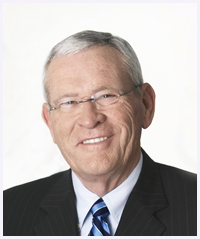Ed Whitacre's turnaround: I know spin when I see it


Yesterday at the TelecomNext, the same AT&T CEO Ed Whitacre (at right) who has been calling the idea that his company does not have the right to charge extra carriage fees for high-bandwidth Web content "nuts," sounded like he's mellowed out.
"Any provider that blocks access to content is inviting customers to find another provider," he said. "And that's just bad business."
So what do we owe this transformation of a growling, defiant telecom bully into a kinder and gentler soul?
Well, the question is academic, because there has been no transformation. Just S-P-I-N.
Like an Arctic white wolf can smell an Arctic hare miles away, I have a very good S-P-I-N detector. In my career, I have seen controversial statements and/or behavior being quickly followed by professionally directed damage control squads.
Along that line,I can envision a pre-TelecomNext conversation between Whitacre, and perhaps his government affairs and senior p.r. brain trust going something like this:
"Mr. Whitacre (he doesn't look to me like someone you would call by his first name), ever since you spoke to Business Week (where he called the idea of free carriage "nuts") we have been beaten up in the press, and on Capitol Hill. And you know, the stakeholders are getting a bit nervous about this "net neutrality" legislation that (Senator Ron) Wyden has proposed.
"Although we agree totally with your case, with all due respect sir, we would advocate that you take a bit of a kinder, gentler approach. Perhaps you might want to articulate your views in terms of having no intention of blocking this third-party content. We think that would serve to disarm those regulators and Senators of their most powerful argument for the kind of 'net neutrality' legislation that we all agree would be harmful to the growth of our company.
"It is our view, sir, that making this point forcefully would take wind out of the sails of those who would wish to mandate net neutrality - by dismissing the worst case scenario that net neutrality advocates seem to be using in order to build support."
I have no proof this kind of conversation happened, but I am willing to bet it did.
But OK, so AT&T won't block third-party content. Yet you can bet that absent net neutrality legislation, AT&T will be strongly tempted to try elevated speed and service tiers for some content. The broadband duopolists will position this policy in a positive light as a quality of service guarantee to the consumer, not the competition-hindering, monopolistic fee-extracting business model that it really is.
If and when this is done, I don't see the current political reality as thwarting this plan. Not blocking packets will - as my presumed "fly on the wall" perception I just articulated- will blunt net neutrality's appeal among enough policy makers and lawmakers to make a difference.
FCC chair Kevin Martin is giving off indications he will fall in line. Yesterday at TelecomNext, he said he supports the right for network operators to differentiate their networks and prioritize traffic on their networks.
"We need to make sure we have a regulatory environment (in which network operators) can invest in the network and can recoup their costs," he said.
I will say it again: S-P-I-N.